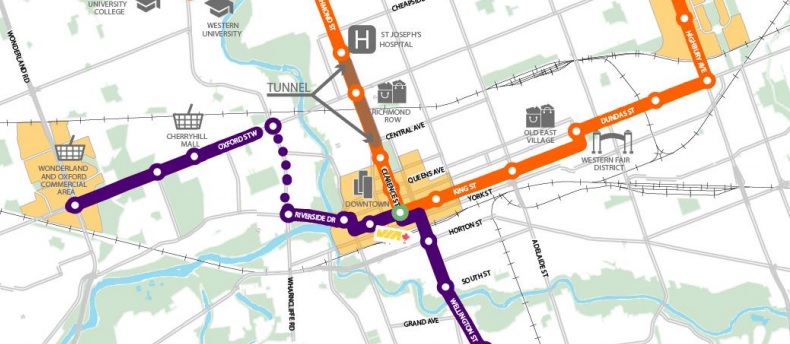A new poll commissioned by Down Shift London suggests a majority of respondents are opposed to the city’s controversial bus rapid transit plan.

The poll, conducted by Forum Research, found 67 per cent of respondents opposed the BRT plan. The poll was conducted on May 2 by telephone and had a sample size of 712 people. Its results have a margin of error of +/- 3.67 per cent 19 times out of 20.
The second question on the poll asked about support for the BRT project: 21 per cent said they supported it, 67 per cent said they opposed it while 12 per cent were undecided.
Prior to answering that question, respondents were told the system will cost more than $700 million, a figure that includes both the cost to build the rapid transit system and the estimated cost to operate it. The London Transit Commission’s (LTC) operating budget is expected to double from its current level of $65 million to $120 million by 2035 if rapid transit is approved.
READ MORE: Timeline: London bus rapid transit
The poll found there was significant disapproval for the proposed tunnel, which is key to the high-frequency system being successful. The tunnel would run from Central Avenue, under the CP Rail tracks, exiting at St. James Street. It would only be accessible to buses and emergency vehicles.
When asked if they were in favour of “digging the tunnel,” 23 per cent of respondents were in favour, 68 per cent were not in favour while eight per cent said they didn’t know.
The cost of the tunnel is estimated to be $90 million, or around one-fifth of the BRT project price tag. Many downtown business owners have called for an alternate route, such as moving the line west to Wharncliffe Road.
“Overall there’s pretty strong opposition to the plan, residents feel it’s been rushed through without much consultation or feedback from the public,” said William Schatten, vice-president, research and analytics at Forum Research.
The survey’s release Tuesday sparked further debate about the controversial plan. Proponents of BRT argue the survey includes misleading information.
“First of all they say the project is going to cost $700 million,” said Coun. Jesse Helmer. “The capital cost estimate is $560-million. Both are a lot of money, but one is a lot lower than the other.”
Another claim in the poll reads “if implemented, it will… eliminate most street parking downtown,” but Helmer says of the 711 parking spots downtown, only 11 per cent will be cut.
“I think they need to be accountable for the kind of false information and the campaign that they’re doing. It’s very easy to appeal to people’s fears and create uncertainty and doubt, it’s very easy to do that. Especially when you’ve got a lot of money and you can send flyers to every household in London, which is apparently what they’ve done.”
- Iran fires air defences at military base after suspected Israeli drone attack
- U.S. aid to Ukraine, Israel set to pass. But bills differ in one key area
- Carbon rebate labelling in bank deposits fuelling confusion, minister says
- Conservatives ask interference inquiry judge to rule elections were flawed
READ MORE: More than 900 gather for BRT input meeting at Budweiser Gardens
The release of the poll comes six days after a lengthy and emotional public participation meeting held at Budweiser Gardens, which attracted 900 people and lasted for over six hours. The majority of the people who attended and spoke at the meeting either opposed the plan outright or wanted changes to the proposed routes.
“We felt it was important for the city council, before it votes on May 15, to understand what residents think about this largest infrastructure project ever proposed for London,” said Dan McDonald of Down Shift in a release. “Clearly, the BRT is highly unpopular. If council approves the plan, it will be doing so without a mandate from the public and against the wishes of most voters.”
Respondents to the poll indicated the outcome of the route debate next week would have a big impact on how they voted in next year’s municipal election. When asked if their councillor voted in favour of the plan, would that make them more or less likely to vote for them again next year, 12 per cent said more likely, 69 per cent said less likely while 19 per cent responded they didn’t know.
“I thought it was very political savvy. This looks like it’s designed to shape a public narrative and I think it will be very effective at doing that,” said Matt Farrell, Fanshawe College professor of interdisciplinary studies.
However, Farrell cautioned against reading too deeply into the findings.
“There’s a lot of stuff here that just from a research perspective I would be cautious of before embracing fully,” he said. “I don’t think this gives us anything new in terms of knowledge. This doesn’t give us a clear picture of London’s sentiment around this issue.”
The BRT plan itself was approved by city council last year. The system would see high-frequency buses running on L and 7 shaped corridors, both running through the downtown.
The poll commissioned by Down Shift London, a group of downtown merchants and residents who oppose the plan as currently proposed, is the first poll done in the city gauging widespread support or opposition.









Comments